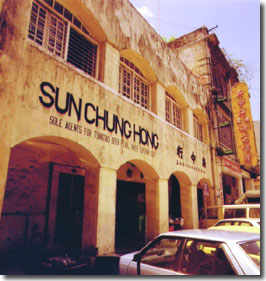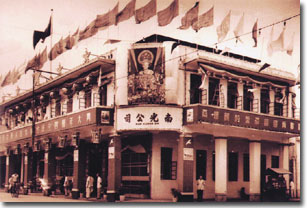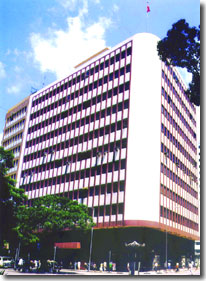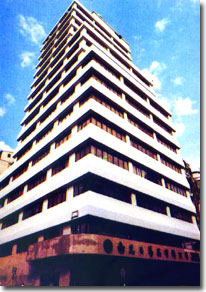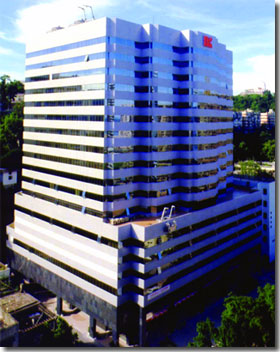History of Nam Kwong (Group) Company Limited
Headquartered in Macao, Nam Kwong (Group) Company Limited is a state-owned enterprise under the direct administration of the central government. Its predecessor, known as Nam Kwong Trading Company, was founded by Mr. Ke Zhengping under the authority of the central government on August 28, 1949. With a history of over 60 years, the company is the oldest Chinese-funded organization in Macao. Entrepreneurs of the older generation represented by Mr. Ke threw their heart and soul into the establishment, development and expansion of Nam Kwong, as well as the prosperity and stability of Macao. Their contribution was remarkable.
The newly-built company commenced an extraordinary venture in a loaned attic on San Ma Lo, literally New Road, with tough conditions of limited personnel and supplies. Despite of this, it was commissioned with extremely important political and economic tasks, including two major ones. The first was to supply people in liberated areas with critical materials, including grain, edible oil, coals and salt among other life necessities, so as to usher in the final liberation across the country. The second task was to break the blockade imposed by imperialist countries and transship critical supplies to the Chinese mainland. Instead of direct engagement in trading as indicated by its name, Nam Kwong mainly focused on cargo transshipment. Under given historical conditions, the company handled more cargos than those in Hong Kong, and much freight from Hong Kong needed to be transshipped through Macao. The transshipping route established by Nam Kwong made great contributions to China’s War of Liberation from 1945 to 1949, anti-blockade endeavors, and the war to resist U.S. aggression and aid North Korea. As there was too much freight to be handled, the company was stressed out. Its own terminals and warehouses were not enough to hold the dramatically increasing freight, some of which had to be temporarily put in rented ones. In the difficult times, Mr. Ke led the founding members of Nam Kwong to work day and night and spent countless sleepless nights. While attaining preliminary achievements in fulfilling its tasks, Nam Kwong made unremitting efforts in easing the shortage of life necessities for Macao people. As a result, it expanded its influence and established a favorable good corporate image in Macao. Keeping the historic tasks in mind, founding fathers of the older generation braved the hardships in the arduous venture and made indelible contributions to the growth and expansion of Nam Kwong.
After the People’s Republic of China was founded, Nam Kwong adapted to the changed economic, political and social conditions and kept forging ahead, following the development path of taking root in Macao and contributing to the prosperity of Macao.
Serving the country by fostering thriving businesses and bringing prosperity to Macao had been the goals the older generation strived for. In the 1960s and the early 70s, Nam Kwong had its line of business focus on terminals, warehouses, freight transport and trading. It also set up a subsidiary of China Travel Service (Macao) Ltd. To boost local industry and commerce, founding fathers of Nam Kwong gave full play to their social connections to expand the lines of business. Nam Kwong played an active role in channeling needed supplies with local businesspeople from all kinds of trade fairs at home and abroad for the Macao market. During the “cultural revolution,” the halt of transportation by land and sea from the Chinese mainland caused food shortage in Macao. In order to relieve people from worrying about food, Nam Kwong promptly channeled rice supplies from neighboring areas and transport them to Macao. By renting more warehouses and adding more food reserve, the company helped stabilize the market and contain the price. “Securing supplies and containing prices” was the guideline put forward by Nam Kwong in the 1960s. As the sole export agent of Chinese goods, Nam Kwong, under the leadership of Mr. Ke, advocated purchasing indigenous goods as a way of patriotism in Macao. As a result, life necessities like grain, edible oil and livestock among other food in Macao’s market were supplied from Chinese mainland. With the booming garment and construction industries in Macao, more and more textile products and building materials also came from the mainland. Thanks to these, Nam Kwong set its reputation in Macao’s market and enriched the daily life supplies of local residents.
The founding fathers of Nam Kwong, with Mr. Ke as a representative, were well aware of the importance of building a united front, uniting patriotic forces, and supporting Macao’s business circles in economic activities. Through their efforts, patriotic businesspeople from Macao and Hong Kong came to invest businesses in the mainland. The economic and trade cooperation and contacts between the mainland and Macao became closer, and the economic development and social stability were also greatly promoted. At that time, Mr. Ke gathered together with respected public figures like Ho Yin, Ma Wanqi, Cui Deqi and Cui Leqi in his office to discuss the situations and markets. Many of his business decisions were made based on such extensive discussions. The founding fathers of Nam Kwong had ardent love for the motherland, and were also compassionate about Macao compatriots. They would regard affairs in the interest of Macao people as their own responsibility and spare no effort in devoting whatever they have. In the early 1980s, Mr. Ke, together with public renowned figures like Ho Yin, Henry Fok Ying Tung, Stanley Ho, Ma Wanqi and Zheng Yutong, contributed funds to building roads and bridges connecting Macao and four ferries in Guangzhou. What they did offered a new path for funding transportation infrastructure, facilitated transportation between Macao and Guangdong Province, and promoted the economic development in the Pearl River Delta region as well as reform and opening up of the mainland.
The history of Nam Kwong is inextricably intertwined with the economic development of the motherland and the stability and progress of Macao. As the sole agent of China’s foreign trading corporation in Macao, Nam Kwong has been proactively working on expanding the lines of business and exploring new markets under the guideline of taking root in Macao, depending on the mainland, going global and serving the modernization endeavors of the motherland and social stability and economic development of Macao. Its turnover witnessed a surge to some $80 million or $90 million in the mid-70s from some $4 million or $5 million in the mid-50s. In the late 70s, the company began to invest slightly in the manufacturing sector in Macao. It also roll out measures to improved business infrastructure, expand business and reinforce its capability. They include expanding terminals by reclaiming the sea, building warehouse and refrigeration house and garages and dormitories for the employees, and establishing freight transport teams.
Under new circumstances, Nam Kwong started to separate government functions from its management on July 1, 1984. Since then, it has been dedicated solely to business activities. With China’s reform and opening up, Nam Kwong also witnessed a thriving business and rapid growth. To meet the need of expansion, Nam Kwong (Group) Company Limited was incorporated with the approval of the central government on the basis of the original Nam Kwong Trading Company on August 23, 1985. Nam Kwong ushered in a new developed stage. In the early 1990s, Nam Kwong grew to an enterprise with over 30 subsidiaries and functional departments and more than 1,000 employees. It had established direct or indirect trade relations with some 1,000 customers in over 70 countries and regions across the world. Domestically, it had more than 60 wholly-owned enterprises or joint ventures in 15 provinces and municipalities, involving more than 10 sectors of textile, garment, building materials, food, tourism, leasing and real estate. The company set up directly affiliated offices in Beijing, Guangzhou, and Zhuhai. The overseas market had been expanded as the company set up wholly-owned enterprises or joint ventures in Australia, New Zealand, Portugal, the United States, Singapore, Russia, Czech Republic, Vietnam, Panama, Hong Kong, and Saipan among others. Via sole proprietorship, joint venture, joint operation, partnership or equity participation, Nam Kwong had over 100 enterprises and stores in various sectors at home and abroad, moving toward a comprehensive multinational conglomeration with diversified businesses. In 1988, the company’s trade volume hit $643 million, and in 1994, the turnover amounted to $1.636 billion.
Nam Kwong traveled through a bumpy road. In the second half of the 1990s, against the backdrop of global economic slowdown, especially the Asian financial crisis and the internal management problems, Nam Kwong was mired in a serious debt crisis. The State Council thoroughly examined the subjective and objective environments encountered by Nam Kwong, and evaluated its position and influence in Macao. To ensure the smooth return and peaceful handover of Macao, it decided to save Nam Kwong by reshuffling the company and addressing the debt issues through debt-to-equity swap. A new era in the history of Nam Kwong was started.
As reshuffle began in 2000, Nam Kwong put forth a new guideline of bracing up, refreshing the mindset, taking the opportunities and recreating new glories, and a corporate philosophy of being meticulous, pragmatic, solidary and self-reliant, to inspire the employees. Based on previous lessons, the management and employees of Nam Kwong made concerted efforts in a pragmatic and proactive manner to carry out the reshuffle for the renewal of the company. With their joint efforts, Nam Kwong made up the deficits and achieved steady profit growth. Its corporate reputation and image were being gradually recovered, laying a foundation for its further development.
In July 2003, Nam Kwong took over China Travel Service Macao (Holding) Co., Ltd. with the approval of competent authority, and made the company a subsidiary under the new name of China Travel Service (Macao) Co., Ltd. And at the end of 2005, the subsidiary changed its current name of China Travel Service (Macao) Ltd. The restructured and integrated company had its comprehensive strength and influence in Macao and the trade greatly improved. As a result, its composite competitiveness was enhanced.
As the predecessor of China Travel Service (Macao) Ltd., China Travel Service Macao (Holding) Co., Ltd. was established by Mr. Ke in June 1961. It was the first Chinese-funded travel agency in Macao. With the purpose of promoting tourism in Macao across the mainland and the world, China Travel Service (Macao) Ltd. specializes in applying for various credentials and documents for foreigners and compatriots in Taiwan, Hong Kong and Macao with the commission of competent authority. It offers services to facilitate overseas Chinese, and compatriots in Hong Kong, Macao and Taiwan to travel and visit relatives in the mainland, and foreigners’ sightseeing tours in China. Over decades of hardworking, the company has emerged as the largest travel agency with a full range of facilities and services in Macao. In honor of its outstanding contributions to tourism in Macao, Edmund Ho Hau Wah, then Chief Executive of the Macao Special Administrative Region (Macao SAR), awarded China Travel Service (Macao) Ltd. the Order of Merit in Traveling on December 19, 2001.
Thanks to the guidance and support of State-owned Assets Supervision and Administration Commission of the State Council (SASAC) and the Liaison Office of the Central People’s Government in the Macao SAR among other superior authorities, the understanding and cooperation of shareholders, and its own unremitting efforts, Nam Kwong finished the nine-year-long debt-to-equity swap in 2007. The greatly improved asset-liability structure added robust momentum to its development. Also in 2007, with a large amount of meticulous efforts by Nam Kwong and the Liaison Office of the Central People’s Government in the Macao SAR, a package solution was introduced to legacies left by previous China Travel Service Macao (Holding) Co., Ltd., which pended for over 20 years in total, and five years since its incorporation with Nam Kwong, and involved with more than 10 organizations. During the process, credits and debts with a total amount of hundreds of million yuan were verified and settled, and the property rights relations and legal status of the acquisition were also straightened out. State-owned assets registered under individual names due to historical reasons were transferred back to the possession of the state. By that time, major historical legacies affecting the development of Nam Kwong had been basically solved, and the foundation for its development was reinforced.
Under the vigorous support of the SASAC and Sinopec, Nam Kwong took over Shanghai Pudong Shihua Economic Development Corporation in 2007, a subsidiary to Sinopec with similar line of business with Nam Kwong, for free in line with the principle that centrally-administrated SOEs should integrate subsidiary assets of the same line of business from the peer SOEs. The corporation was reshuffled into Nam Kwong (Shanghai) Investment Company Limited and became an important business in the mainland.
Development is of overriding importance. Keeping abreast of the times, pressing ahead, and taking the opportunities for further development is the historic mission of the new leadership of Nam Kwong. They have been fully acted upon the scientific outlook on development to achieve the comprehensive, coordinated and sustainable development of Nam Kwong. It devoted great energies in studying the strategy for corporate development and formulated the Development Strategy and Planning for Nam Kwong (Group) Company Limited. The corporate vision was set as “to grow as an effective manager of diversified assets portfolio, the strongest provider of fossil fuels, grain and edible oil, tourism and logistics services, a competitive business in the Chinese mainland’s real estate sector, agricultural and sideline products, and special logistics, and a global enterprise with diversified businesses and distinctive main line of business. In Macao where it is based, the company will reinforce and expand its existing businesses. In Chinese mainland whose market it has set eyes on, the company will focus on real estate development, agricultural and sideline products and logistics services. Meanwhile, Nam Kwong will seek new growth momentums and make prudent investments.
In retrospect and prospect, Nam Kwong has been following and will follow the principles, guidelines and policies made by the Central Committee of the Communist Party, and the administration and supervision of the SASAC and the Liaison Office of the Central People’s Government in the Macao SAR. It will also carry forward the fine traditions of loving both the motherland and Macao, resolutely uphold the practice of “One Country, Two Systems,” and observe the basic laws of the Macao SAR. In line with the scientific outlook on development, Nam Kwong will forge ahead following the corporate purpose of giving back to society with the best. In this process, it will voluntarily abide by the laws of corporate development, establish the core corporate values of pursuing development, keeping good faith and competing in performance. With reform as the driving force, management as the foundation, market as the orientation, and customers as the focus, Nam Kwong will be courageous to break new grounds, speed up strategic transformation, and increase investments in real economy. Based on its achievements in Macao, it will actively explore the markets of Chinese mainland, finish the transformation from a traditional trading business to a modern service provider, fulfill its corporate social responsibilities, and made due contributions to the stability and prosperity of Macao as well as the completing of the building of a moderately prosperous society in all respects.
